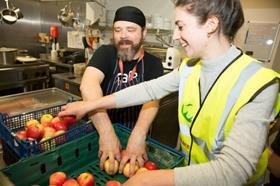
Globally, one third of the food we produce is wasted, at great environmental cost. When you consider the resources involved in growing, preparing and transporting that food, that figure is even more shocking. But, with a growing ‘zero waste’ movement, and increasing pressure from consumers, companies are waking up to the problem and pledging to take action. By 2020 half of the UK’s biggest food companies will have committed to both measure and reduce their food waste, as set out in WRAP’s Food Waste Reduction Road Map.
Using surplus food for good
One of the simplest ways companies can address food waste is by diverting surplus to good causes in their local communities. And it’s already making a huge difference.
FareShare is the UK’s largest food redistribution charity, taking edible surplus from growers, packers, manufacturers, suppliers and retailers and redistributing it through a network of 10,000 frontline organisations, such as homeless hostels, school breakfast clubs, domestic violence refuges, older people’s lunch clubs, food banks and hospices. Every week FareShare provides enough food to create almost a million meals for vulnerable people, through its network of 21 regional centres.
Fruit and veg is particularly valuable to charities, many of which support those in food poverty, including children. Helen Dabreu is the chef at Anne Bernadt nursery in Peckham. Around 70 per cent of the food she cooks with comes from FareShare and, with no state funding, it’s vital to keep their kitchen open. Helen says: “It’s important to grab them young. One mum insisted her child wasn’t going to eat any vegetables and he’s turned out to be the best eater. He’ll try anything.”
Breaking down barriers to redistribution
Of course, there are a number of barriers when it comes to redistributing surplus. That’s where FareShare comes in. The charity already work with 500 UK food companies, and work closely with each one to help them redistribute their surplus in the most efficient and cost effective way possible. Jo Dyson, Head of Food at FareShare, explains: “We know cost is an important factor for all businesses small or large, so we work with them to overcome those cost barriers, for example labour costs, additional processing or packaging and storage.”
And the individual approach pays off. Kellie Schofield, Manager – Sustainability, IPL, says: “Working with FareShare made us focus on what’s really important in terms of surplus and waste. Waste efficiencies are improving, from the way we look at waste and how and where this goes, to understanding the end to end cost of alternative waste routes. On top of all that it motivates our employees to know that we're helping vulnerable members of the communities in which we operate”
Find out how your business can redistribute food surplus to frontline charities. Visit FareShare’s website www.fareshare.org.uk/giving-food/



